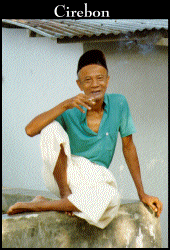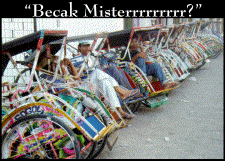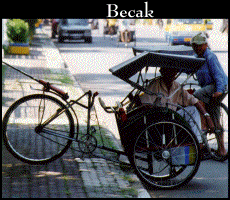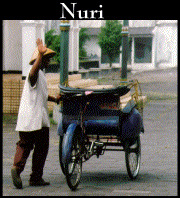
Often times, people in the West equate dignity in public with a certain level of formality and rigidity as if these are only attainable by those with knowledge of high culture. I guess I was presently surprised then,  when after arriving at Jakarta's airport I noticed how several of the Indonesians, waiting for transportation, casually slipped out of their sandals and put their feet up on the common bench. They were all very clean people and you could be assured that the feet that they put up on seats had not touched a dirty floor. Sure it was a simple enough occurrence, but it evoked a sense of inoffensive comfort in public that I have rarely seen.
when after arriving at Jakarta's airport I noticed how several of the Indonesians, waiting for transportation, casually slipped out of their sandals and put their feet up on the common bench. They were all very clean people and you could be assured that the feet that they put up on seats had not touched a dirty floor. Sure it was a simple enough occurrence, but it evoked a sense of inoffensive comfort in public that I have rarely seen.
For those of you who might suggest that I was enamored with something that was simply exotic to me, I might add that some of the older women I saw in and around Yogyakarta were probably the most dignified women I've ever seen in my life. Their posture was straight as a board, their sarung, kebaya, and selendang were all well cared for, and their hair was tightly pulled back and clipped on their head in a bun. These particular women that I speak of didn't look at all tired with age. They possessed a bearing of strength, exuded a humble knowledge of a lifetime, and yet still had that alertness that comes with curiosity.

The typical becak driver spends most of his time sleeping in his becak, the second most significant portion of his time haggling with would-be customers, and the least portion of his time driving customers from one place to the other for a fare. We found an exception to this rule in Yogyakarta - a becak driver named Nuri.
We had wanted to see "batik process", the process by which batiks are made, so we went to Jalan Tirtodipuran which is known for its batik shops, antique shops, and curios. Typically if a street anywhere is known for anything this means it is going to be one of the most expensive places you can find for such goods and Tirtodipuran was no exception. We knew this in advance, yet we were not prepared for the onslaught of Javanese seeking commission for delivering tourists to the storefronts of particular batik shops. First our becak driver tried to steer us to a particular shop. When I saw that he was about to go into the shop, I realized that he was going to get a commission for delivering us.  I had nothing in particular against him earning a living this way, it's just that these are typically shops priced specifically for tourists. At the same time a teenaged boy approached us and tried to give us a business card of another batik shop. particular Then a third man approached us to take us to his favorite shop. After we went in to a shop of our own choosing, we broke down and decided to go ask the becak driver where we could see batik being made. He had been hovering outside the store we had gone into and was only too happy to show us to his favorite shop. This time, though, he kept telling us that we need not buy anything at the shop - apparently his commission was not contingent on this - and we could leave the shop as soon as we saw the "process".
I had nothing in particular against him earning a living this way, it's just that these are typically shops priced specifically for tourists. At the same time a teenaged boy approached us and tried to give us a business card of another batik shop. particular Then a third man approached us to take us to his favorite shop. After we went in to a shop of our own choosing, we broke down and decided to go ask the becak driver where we could see batik being made. He had been hovering outside the store we had gone into and was only too happy to show us to his favorite shop. This time, though, he kept telling us that we need not buy anything at the shop - apparently his commission was not contingent on this - and we could leave the shop as soon as we saw the "process".
 After we took a self-guided tour of the batik being made, I wanted to go search for a kris. After unsuccessfully attempting to get the shop owner to lower his price for a certain kris, I left the shop only to be approached by a fourth person concerned about where we were going and what I was hoping to purchase. His face was pockmarked, and he was thicker than most becak drivers - he later told us his stomach was big, but not from beer drinking. He asked me if I was looking to buy a kris. I don't know if he had spied me in the shop we had just exited or expected me as a male tourist to be interested in such a thing. I listened to him and asked him a few questions as he told me he could direct me to his favorite place. He told me he could show me new or old kris and when I asked him if he would be receiving a commission for taking us there he replied, "no, that's why I'll charge you RP1,000. If I took you to one of these shops [referring to the tourist shops on Tirtodipuran] I'd charge you RP500 because they'd give me a commission." He was offering to take us to the Kraton Yogyakarta where the money we spent would be given back to the Kraton. We finally agreed and he actually took us to the compound which enclosed the Kraton museum.
After we took a self-guided tour of the batik being made, I wanted to go search for a kris. After unsuccessfully attempting to get the shop owner to lower his price for a certain kris, I left the shop only to be approached by a fourth person concerned about where we were going and what I was hoping to purchase. His face was pockmarked, and he was thicker than most becak drivers - he later told us his stomach was big, but not from beer drinking. He asked me if I was looking to buy a kris. I don't know if he had spied me in the shop we had just exited or expected me as a male tourist to be interested in such a thing. I listened to him and asked him a few questions as he told me he could direct me to his favorite place. He told me he could show me new or old kris and when I asked him if he would be receiving a commission for taking us there he replied, "no, that's why I'll charge you RP1,000. If I took you to one of these shops [referring to the tourist shops on Tirtodipuran] I'd charge you RP500 because they'd give me a commission." He was offering to take us to the Kraton Yogyakarta where the money we spent would be given back to the Kraton. We finally agreed and he actually took us to the compound which enclosed the Kraton museum.
There he introduced  us to a man who welcomed us into his humble home to view several incredibly well cared-for kris. Each one was wrapped in a custom made clothe and all the blades smelled of a fragrant oil. Just the way this guardian of these kris handled these treasures made us honor the experience, but the detail work of the blades is what impressed us most (in fact we would see only blades in museums that compared though we did later see some craftsmanship in the handles and scabbards of kris in Malaysia that was unparalleled in its own way). Nuri sat back and at times helped translate at crucial moments, but kept quiet much of the time (except when he advised us that we could negotiate any of the prices we were given). At the time, I thought I was paying a great deal for the kris I left with, but I later found out that it was priced very reasonably. It seemed to both me and Karen that the visit and experience with this man, who treated these cultural icons with such care, was worth much of the price we had spent on a unique cultural souvenir.
us to a man who welcomed us into his humble home to view several incredibly well cared-for kris. Each one was wrapped in a custom made clothe and all the blades smelled of a fragrant oil. Just the way this guardian of these kris handled these treasures made us honor the experience, but the detail work of the blades is what impressed us most (in fact we would see only blades in museums that compared though we did later see some craftsmanship in the handles and scabbards of kris in Malaysia that was unparalleled in its own way). Nuri sat back and at times helped translate at crucial moments, but kept quiet much of the time (except when he advised us that we could negotiate any of the prices we were given). At the time, I thought I was paying a great deal for the kris I left with, but I later found out that it was priced very reasonably. It seemed to both me and Karen that the visit and experience with this man, who treated these cultural icons with such care, was worth much of the price we had spent on a unique cultural souvenir.
Nuri, was a father of three boys aged 4, 8 and 12, we later learned. He didn't consider himself to be a devout Muslim, but he blamed his job in part saying, "we [becak drivers] have no time for prayers because we work from morning to night." We liked Nuri, because he seemed to be the most honest person we had met amongst anyone that we had a money transaction with in Yogyakarta.

Leaving the airport at Denpasar in our over priced taxi, I was reminded of Las Vegas: a large, showy statue of horses and carriage with some mythical creatures fighting upon them decorated one corner. Further along the road, a brightly lit, colorful complex and buildings adorned with facades of overly elaborate carvings. As we entered Ubud that evening, the pedestrians on the streets all seemed to be fair-skinned people from the West. When we got out of the taxi, the sounds of crickets, lizards and other small creatures were disturbed in my mind by someone singing Rod Stewart's "Tonight's the Night." Needless to say , our arrival in Bali had me worried that we had traveled so far only to land in another Hawaii.
From the perspective of tourist saturation and tourist culture, the difference between Hawaii and Bali has a lot to do with who controls the commercialization of the islands. In America, several mainland commercial interests went to Hawaii and developed restaurants, hotels, and the ancillary tourist industry without any real concern for the indigenous culture which had been subverted for several decades prior to the rise in tourism there. In Bali, perhaps less so in Kuta than Ubud, the commercialization seemed to benefit the local population more. The Balinese outside of Kuta, for their part, seem intent on building a psychological wall between their culture and tourism. Whether they can avoid the process of commercialization that one author, in reference to an entirely different country, said leads to a "museum culture" remains to be seen.
Perhaps it is just human nature that people in Bali strive to become more like us in the West in spite of the fact that we in the West consider many aspects of Bali paradise.

They were both once part of the Majapahit kingdom, but when the Hindu Majapahit fell to the Muslim sultans, many of its followers fled to Bali. Centuries have past, the Dutch forcibly and brutally reintegrated them into a colonial empire, and as a result they both fell within the new Indonesian Republic with independence. The Javanese have a unique way of pronouncing an "r" with a short, rolling "rrrrr". Balinese people also do this owing, I suppose, to their ancestral roots in Java. What distinguishes the two peoples though is their respective religions: Islam and Hinduism. Hinduism can still be seen on Java. In the wayang productions of the Mahabarata and the Ramayana, and in death ceremonies for example, Hinduism still has a presence on Java. A Muslim Sundanese man told us that many Muslim Indonesians do not follow the proper way of Islam because they have a feast when someone dies. He said this was a holdover from pre-Islamic Hindu Java and that it is contrary to the teachings of the Qu'ran.

